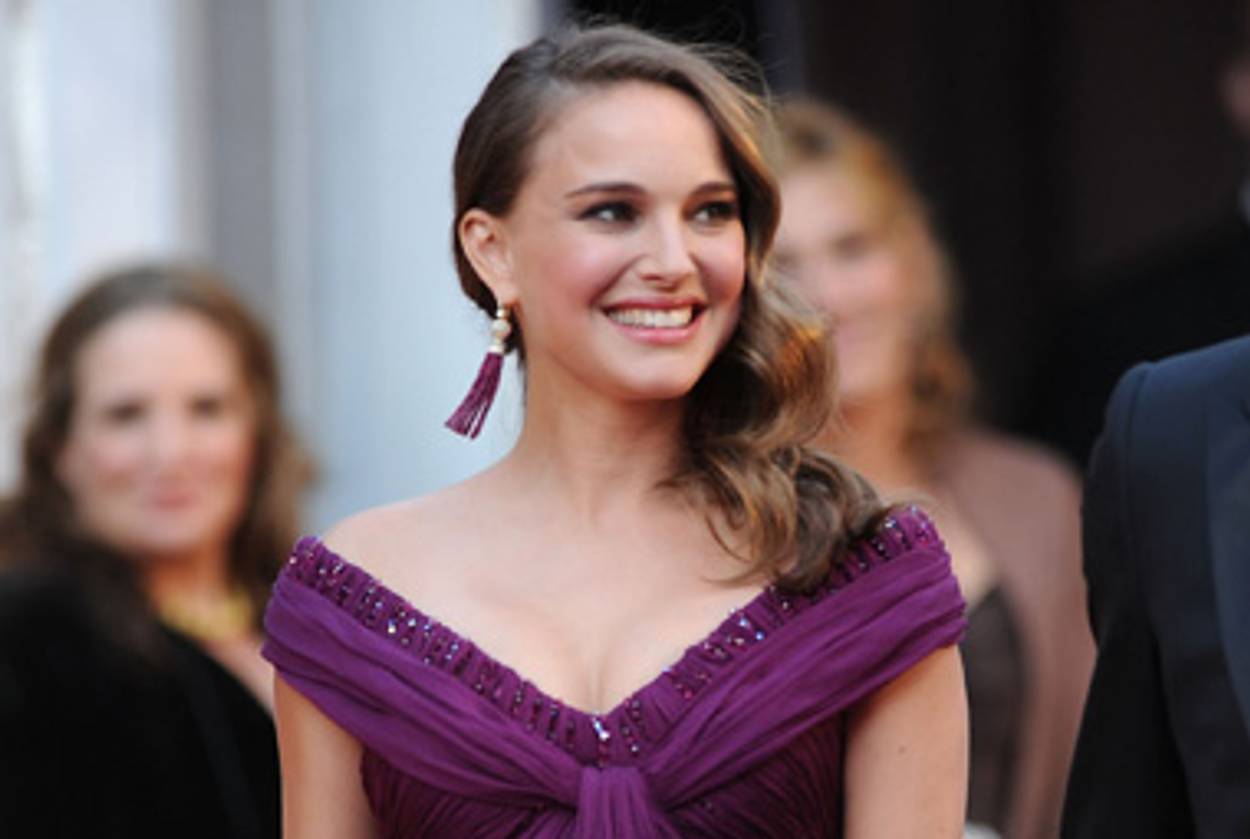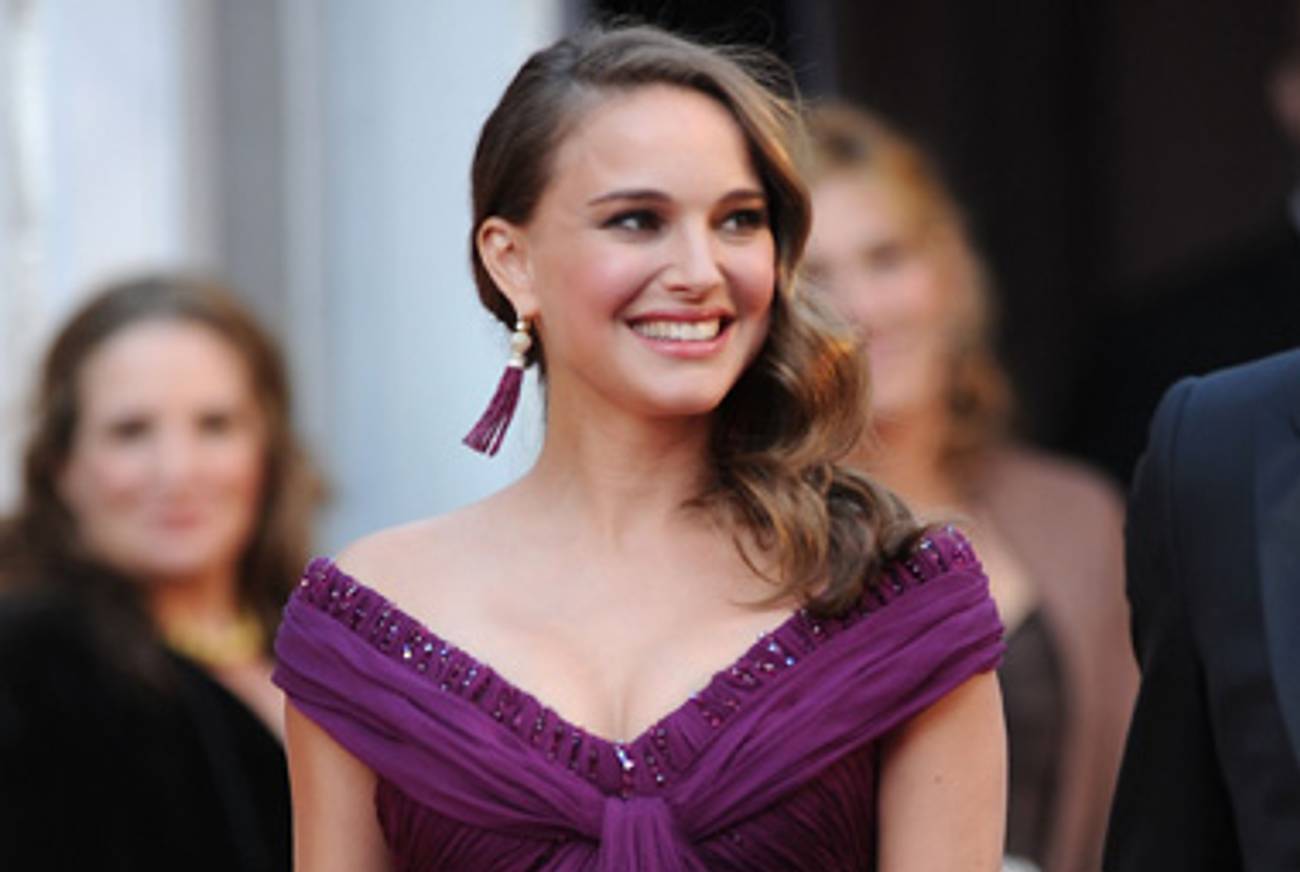‘Proud to Be Jewish’
Natalie Portman, Oscar winner and face of Dior Cherie perfume, condemned Dior designer John Galliano’s anti-Semitic outburst. In 2005, she spoke about her deep Jewishness for the book Stars of David.




Read Portman’s statement on John Galliano here.
On a cool October morning, actress Natalie Portman is wearing a jean jacket and dangling beaded earrings, sipping tea in Schiller’s Liquor Bar on the Lower East Side of Manhattan. She talks about the difference between Jews in Israel and Jews in Long Island. “I definitely know what being Jewish in Israel means and what being Jewish in America means,” says this 24-year-old, who was born in Israel to an Israeli father, fertility specialist Dr. Avner Hershlag, and an American mother, artist Shelley Hershlag.
They moved to the United States when she was 3, and they return to Israel every year to visit family. Portman, who uses her grandmother’s maiden name professionally, attended Jewish day schools until eighth grade—mostly, she says, because her parents wanted her to keep up her Hebrew. But the Hershlags were not a religious family, nor involved in the local synagogue. “I grew up in the classic American Jewish suburbia, which has a whole different sense of what it means to be Jewish than anywhere else in the world.”
I ask her to elaborate. “The people I grew up with on Long Island are wonderful people. But I have friends who grew up in $5 million homes, they all drive BMWs, and the only places they’ve been to outside the United States are the islands in the Caribbean. Which is fine, it’s a choice, and I don’t want to be critical of that. But I am. I think it can definitely be a problem, especially since American Jews are the ones who are in a position—politically and financially—to help other Jews around the world who are facing problems that we can’t conceive of.”
Portman explains why she never felt a pull to be a part of Jewish life in her Syosset neighborhood. “I never liked going to temple on Long Island because it just had that aura of someone’s fake party to me, which always made me uncomfortable. So I never went to temple at home, I never got bat mitzvahed, I just sort of rejected that whole thing; it seemed so tied up with values that I hated. But on the other hand, when I go to Israel, I always want to go to temple on the High Holy Days even if no one in my family is going with me. I’ll fast. One year in Israel, my family went to Jaffa to get pizza on Pesach and I would not do that. You know, I get much more Jewish in Israel because I like the way that religion is done there.”
As she describes some of her Long Island girlfriends, the slur “JAP” pops into my head and I ask how she feels when someone uses the word. “I mean, I grew up in a Long Island public school that was 60 to 70 percent Jewish and I know what a JAP is,” she says, sipping her tea. “But obviously the word shouldn’t be misused. I wouldn’t want to have stereotypes used in derogatory ways by people outside the Jewish community, but I think it is something from within the community that we need to examine and be self-critical about, because it’s how we’re raising our young people.”
“I had a fashion designer tell me that when I wear a dress of his, it sells out across the country because Jewish girls ‘look to me,’ and Jewish girls are the ones that buy expensive dresses. It made me sort of sad, because I want to be an influence in ways other than by a pretty dress.”
I ask if she’s felt pressure to use her celebrity on behalf of Israeli causes. “I’m very comfortable with that,” she says, “and I’m currently exploring ways to help because I love the country.” She’s recently become more protective of Israel, in part because people around her have become more impatient with it. “I have a very close friend who lately has this European, anti-Israel way of thinking, and it’s very hard for me to have conversations with him. He says, ‘Can’t you be self-critical?’ But it’s hard to be publicly critical. It has to be done in a very delicate, well-thought-out manner. These issues come up at parties and dinners with people who don’t know a lot, and as someone who was born in Israel, you’re put in a position of defending Israel because you know how much is at stake. It’s become a much bigger part of my identity in recent years because it’s become an issue of survival.”
I turn the conversation to her career, asking if she feels some Jewish pride in being considered a Hollywood beauty. “Yeah,” she replies. “The hard thing is that people often don’t associate me with being Jewish. I’m not someone who you look at and say, ‘You’re Jewish.’ People ask me if I’m Spanish, Italian, or even WASPy. So I don’t think I can be representative. But in another way, I think I look very Jewish because all the Jewish girls I grew up with, we all look the same: small, short, skinny, dark hair, dark eyes. Little noses.” She laughs. “So maybe it is time for a new type. I’d like it if people thought I was Jewish-looking.”
She did play an iconic Jew, Anne Frank, on Broadway at the age of 16, and I wonder how personally Portman connected to the character. “Very personally,” she says. “Because my grandparents didn’t talk about those years much, especially my grandfather. His younger brother, who was 14 at the time, was in hiding from the Nazis and couldn’t take it one more day and ran out and was shot in the streets. And his parents were killed at Auschwitz. He was the one I’d always related to in the family. He was sort of the quiet, brilliant man who led Pesach and I would always imagine him or his father in these horrifying humiliating conditions. The humiliation is almost harder for me to imagine than the physical pain.”
When it comes to Portman’s own romantic life, it has obviously been a staple of gossip columns, but she says she’s not necessarily looking for a Jewish husband. “A priority for me is definitely that I’d like to raise my kids Jewish, but the ultimate thing is just to have someone who is a good person and who is a partner.” She says her parents don’t push her one way or another. “My dad always makes this stupid joke with my new boyfriend, who is not Jewish. He says, ‘It’s just a simple operation.’” She laughs. “They’ve always said to me that they mainly want me to be happy and that’s the most important thing, but they’ve also said that if you marry someone with the same religion, it’s one less thing to fight about. But according to that argument, I might as well only date vegetarian guys.”
She doesn’t think it necessarily takes two Jews to maintain Jewish continuity in a family. “I feel the strength to carry that on myself. It’s obviously easier when both parents are in it together, but I don’t necessarily think it has to be.”
Portman says she resists any kind of blind tribalism. “I don’t believe in going along with anything without questioning. I think that’s the basis of Judaism: questioning and skepticism.” She says that for her, basic humanity comes before faith. “To me, the most important concept in Judaism is that you can break any law of Judaism to save a human life. I think that’s the most important thing. Which means to me that humans are more important than Jews are to me. Or than being Jewish is to me.”
Excerpted from Stars of David: Prominent Jews Talk About Being Jewish by Abigail Pogrebin. Copyright 2005 by Abigail Pogrebin. Used by permission of Broadway Books, a division of Random House, Inc.
Abigail Pogrebin is the author of Stars of David and One and the Same. She moderates the interview series “What Everyone’s Talking About” at the JCC in Manhattan.
Abigail Pogrebin is the author of Stars of David and My Jewish Year. She moderates the interview series “What Everyone’s Talking About” at the JCC in Manhattan.